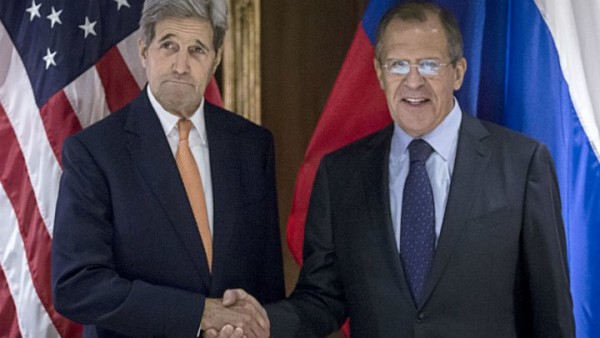
Russia, the United States and powers from Europe and the Middle East outlined a plan on Saturday for a political process in Syria leading to elections within two years, but differences remained on key issues such as President Bashar al-Assad’s fate.
A day after gunmen and suicide bombers went on a rampage through Paris, killing at least 129 people, foreign ministers and senior officials from more than a dozen countries agreed to work for a ceasefire in Syria’s civil war, but U.S. Secretary of State John Kerry said it would not apply to Islamic State.
French President Francois Hollande pledged a “merciless response” to the attacks, which he said had been organized by the Islamist militant force. France is part of the U.S.-led coalition carrying out air strikes against the group in Syria and Iraq.
Speaking in French after Saturday’s talks, which began with a moment’s silence for the victims in Paris, Kerry told a joint news conference with his Russian counterpart that the attacks only strengthened his country’s resolve to fight terrorism.
“The impact of the war bleeds into all of our nations,” Kerry said. “It is time for the bleeding in Syria to stop.”
The Paris attacks shifted the focus of negotiations in Vienna from the detail of which organizations would count as opposition groups rather than terrorist ones, and could therefore take part in a political solution in Syria, to defeating Islamic State militarily, diplomats said.
“I have a feeling that there is a growing recognition of the need to create an effective international coalition to fight Islamic State,” Russian Foreign Minister Sergei Lavrov told the joint news conference with Kerry and the U.N. envoy for Syria.
BLIND EYE TO DIFFERENCES
Russia has for weeks been carrying out air strikes in Syria in support of Assad’s forces. But Western powers say those strikes have mainly targeted armed groups other than Islamic State, such as pro-Western rebel militias.
On Saturday, Russia and the United States seemed to turn a blind eye to their long-standing disagreement over Assad’s fate. The West and its allies say he must leave office, while Moscow and Tehran support elections in which he could stand.
“We still differ, obviously, on the issue of what happens with Bashar al-Assad,” Kerry said. “But we are relying on the political process itself, led by Syrians, which it will be going forward, and the Syrians negotiating with Syrians; that that can help bring a close to this terrible chapter.”
In a joint statement, the countries involved in the talks, including Saudi Arabia, Iran, Turkey and the five permanent members of the U.N. Security Council, laid out a plan including formal talks between the government and opposition by Jan. 1.
The statement did not make clear how those groups would be chosen, but said they should follow principles such as committing to Syria’s “non-sectarian character” and keeping state institutions intact.
An agreement on lists of accepted political organizations and proscribed terrorist groups has consistently eluded negotiators in the talks, the previous round of which was held in Vienna two weeks ago.
“TIMEFRAME TOO AMBITIOUS”
Abdulbaset Sieda, a member of the exiled, Western-backed opposition Syrian National Coalition (SNC), said the timeframe for a planned election sounded too ambitious.
“I am not sure it will be in 18 months’ time. Of course we need to be hopeful for the future, but we need more time,” Sieda told Reuters on the sidelines of the Vienna talks. “A realistic timeframe … is two to three years.”
The SNC has little physical presence in Syria and minimal influence over the fight against Assad’s forces
The participants pledged to “take all possible steps” to ensure that they and those they support adhere to a ceasefire in Syria, where 250,000 people have been killed in the war between pro-government forces and a patchwork of armed groups, many backed by outside powers.
“(The countries) affirmed their support for a ceasefire … and for a Syrian-led process that will, within a target of six months, establish credible, inclusive and non-sectarian governance, and set a schedule and process for drafting a new constitution,” the statement said.
Russian Foreign Minister Sergei Lavrov said most but not all countries at the talks were in favor of an immediate truce.
The joint statement provided for elections supervised by the United Nations “within 18 months”. Diplomats have spoken of an 18-month transitional period, suggesting it would start when the formal political talks begin.
It also said the countries involved agreed to press the parties to the conflict not to use “indiscriminate weapons”, a term that appeared to include barrel bombs – steel drums packed with shrapnel and explosives – which the Syrian government is widely accused of dropping in civilian areas.
Reuters

Leave a Reply
You must be logged in to post a comment.